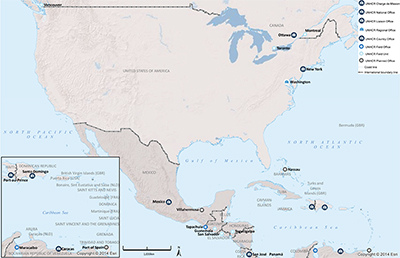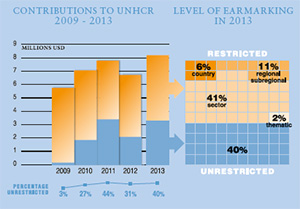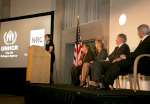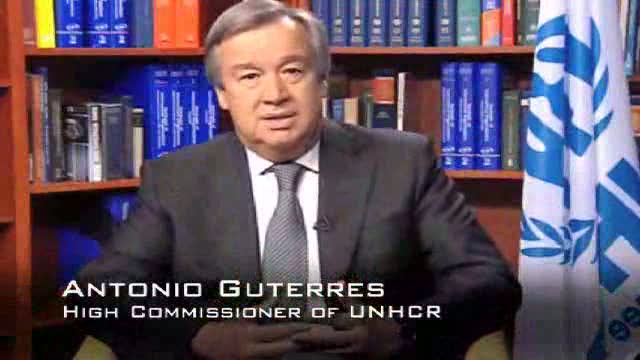Home > Where We Work > Americas > North America and the Caribbean > United States of America
2015 UNHCR subregional operations profile - North America and the Caribbean
| Overview |
In Canada, UNHCR cooperates with government authorities and engages with civil society and refugee advocacy groups, which are particularly active in promoting resettlement opportunities and refugee protection.
Cooperation with various sectors of the United States Government and judiciary, as well as with civil society, aims to improve international protection standards for people of concern. The interpretation of the refugee definition across national jurisdictions, the promotion of alternatives to detention for asylum-seekers, and the strengthening of protection safeguards for interdictions at sea and apprehension at land-border crossings will remain the main focus for UNHCR.
There have been increasing arrivals at the United States' southern border of children from Central America, both unaccompanied and with families. Many have fled violence at the hands of transnational criminal organizations and other armed groups. UNHCR will offer support to ensure that: those in need of international protection can access territory; norms and standards in reception and detention facilities, as well as alternatives to detention, are promoted; and arrivals receive adequate information about their rights and access to legal representation.
States and territories in the Caribbean are confronted with an increasingly complex phenomenon of mixed migration. The management of these mixed migratory flows poses significant challenges to many of the small island and coastal States in the region, not least due to the absence of functioning refugee status determination (RSD) systems in most cases and limited resource capacities. Many countries resort to systematic detention and deportation, without providing protection-sensitive measures that would allow for the identification of people in need of international protection and effective safeguards against refoulement. Local integration opportunities remain limited, as there are only very few countries that grant residency permits and/or work authorization to refugees. In many locations refugees are in need of UNHCR assistance for their subsistence.
In September 2014,at the Caribbean regional consultation held in the Cayman Islands within the framework of the Cartagena+30 process, further progress was made in the protection agenda in the region. Several forward-looking initiatives were discussed, including the creation of a regional consultative process to facilitate data collection and information sharing on mixed migration; the exchange of best practices in refugee protection; and discussion around other common refugee-related issues. Other issues for discussion include: establishing a regional refugee transit centre to transfer those in need of resettlement; enhancing regional capacity to support people of concern, and create or consolidate RSD processes; as well as presenting alternatives to detention and measures to facilitate local integration.
The Dominican Republic adopted legislation in 2014 that attempts to provide a solution for the tens of thousands of Dominicans, the majority of whom are of Haitian descent, who were deprived of their nationality as a direct result of a 2013 Constitutional Court ruling. Gaps in its implementation may limit its impact on solutions that would restore nationality, with the risk of leaving these Dominicans with undetermined nationality.
| Response and implementation |
UNHCR's overarching objectives in Canada relate to its supervisory role in processing asylum requests and seeking the highest protection standards. UNHCR supports an increase in referrals to Canada and the expansion of its resettlement programme as a durable solution. In particular, the Office will follow up with Canadian authorities on the implementation of the various aspects of the 2012 asylum reform and will strive to enhance refugees' integration prospects. Continued advocacy on alternatives to detention for people of concern will remain a priority to further align Canada's current detention policy with international standards.
In the United States, UNHCR strives to maintain support for its global programmes. The Office will also focus on promoting a favourable protection environment for all people of concern. Particular attention will be paid to access to territory and appropriate procedures, as well as alternatives to detention and the integration of resettled refugees. The Office will continue offering support to the authorities for the adequate protection of all unaccompanied children arriving from Central America and Mexico that may need international protection.
UNHCR will work with Caribbean Governments to promote: access to territory and protection against refoulement, with rapid deployment of UNHCR and partner staff when countries experience a significant influx of asylum-seekers; access to fair and effective RSD procedures, including the phased adoption and implementation of effective RSD systems in key countries; alternatives to detention and the monitoring of detention conditions; durable solutions for people of concern, including strategic resettlement; and the prevention of statelessness and protection of the stateless.
Addressing statelessness in the Caribbean is also a primary focus of UNHCR's strategy for the biennium. Partnerships and joint efforts to: find solutions for those individuals with undetermined nationality in the Dominican Republic, or address the likelihood of individuals of Haitian descent becoming stateless in other parts of the Caribbean are particularly important to the Office. Working to align nationality laws with international standards to eliminate the causes of statelessness is an issue throughout Caribbean States. To build on momentum gained, UNHCR will strengthen its Caribbean Unit in Washington and consider establishing a presence in the Bahamas (to cover the northern part of the Caribbean) and Trinidad and Tobago (to cover the southern part of the region).
In the Dominican Republic, UNHCR will ensure that people of concern can access the territory and asylum procedures. Limited relief for education and medical and material assistance will be ensured through partners for the most vulnerable asylum-seekers and refugees, while access to employment and self-reliance will facilitate refugees' local integration. The Office will also focus on solutions, including voluntary repatriation and resettlement. UNHCR will also continue advocating an adequate solution to the country's statelessness population.
The organization's strategy in Haiti will support the ratification of the Statelessness Conventions and the national legislative process on the nationality law and civil registry reform, and address administrative gaps in civil registration and documentation, while promoting increased public awareness around the risks of statelessness. UNHCR will provide the authorities with technical assistance for the adoption of asylum legislation. The most vulnerable asylum-seekers will also receive assistance.
| Financial information |
UNHCR's budget requirements in this subregion have increased from more than USD 17.6 million in 2011 to 21.9 million in 2015.
The 2011 budget was needed to support those internally displaced by the Haiti earthquake. The total 2015 requirements are based on: the Caribbean's renewed engagement in protecting and finding solutions for those travelling in maritime mixed migratory flows; and support for the protection of those displaced from Central America by transnational criminal organizations and other armed groups, who have reached the southern border of the United States.
| UNHCR 2015 budgets for North America and the Caribbean (USD) | ||||
|---|---|---|---|---|
| Operation | 2014 Revised budget (as of 30 June 2014) |
2015 | ||
| Refugee programme PILLAR 1 |
Stateless programme PILLAR 2 |
Total | ||
| Total | 20,427,258 | 12,959,737 | 9,024,219 | 21,983,956 |
| 1. Includes Haiti, Dominican Republic, Puerto Rico, the US Virgin Islands, 12 Independent Caribbean States, three other CARICOM States, and British and Dutch overseas territories in coordination with the Europe Bureau. | ||||
| Canada | 2,042,060 | 1,630,741 | 53,216 | 1,683,956 |
| United States of America Regional Office[1] | 18,385,198 | 11,328,996 | 8,971,004 | 20,300,000 |
Source: UNHCR Global Appeal 2015 Update
UNHCR contact information
| The UNHCR Regional Representation in Washington | |||||||||||||||
|---|---|---|---|---|---|---|---|---|---|---|---|---|---|---|---|
| Style of Address | The UNHCR Regional Representation in Washington | ||||||||||||||
| Street Address | 1800 Massachusetts Ave NW, Suite 500, 20036 Washington, DC, United States | ||||||||||||||
| Mailing Address | 1800 Massachusetts Ave NW, Suite 500, 20036 Washington, DC, United States | ||||||||||||||
| Telephone | 1 202 296 5191 | ||||||||||||||
| Facsimile | 1 202 296 5660 | ||||||||||||||
| usawa@unhcr.org | |||||||||||||||
| Time Zone | GMT + -5 | ||||||||||||||
| Working Hours |
|
||||||||||||||
| Public Holidays | 01 January 2016, New Year¿s Day 25 March 2016, Good friday 30 May 2016, Memorial day 04 July 2016, Independence Day 06 July 2016, eid al fitr 05 September 2016, Labour Day 12 September 2016, eid al adha 24 November 2016, thanksgiving 26 December 2016, Christmas day |
||||||||||||||
| The Director of UNHCR Office in New York | |||||||||||||||
|---|---|---|---|---|---|---|---|---|---|---|---|---|---|---|---|
| Style of Address | The Director of UNHCR Office in New York | ||||||||||||||
| Street Address | 220 East 42nd Street, Suite 3000, 10017 New York, NY, United States | ||||||||||||||
| Mailing Address | P.O. Box 20 Grand NY 10017, Grand Central, 10017 New York, NY, United States | ||||||||||||||
| Telephone | 1 212 963 0032 | ||||||||||||||
| Facsimile | 1 212 963 0074 | ||||||||||||||
| usane@unhcr.org | |||||||||||||||
| Time Zone | GMT + -5 | ||||||||||||||
| Working Hours |
|
||||||||||||||
| Public Holidays | 01 January 2016, New Year¿s Day 25 March 2016, Good friday 30 May 2016, Memorial day 04 July 2016, Independence Day 06 July 2016, eid al fitr 05 September 2016, Labour Day 12 September 2016, eid al adha 24 November 2016, thanksgiving 26 December 2016, Christmas day |
||||||||||||||























